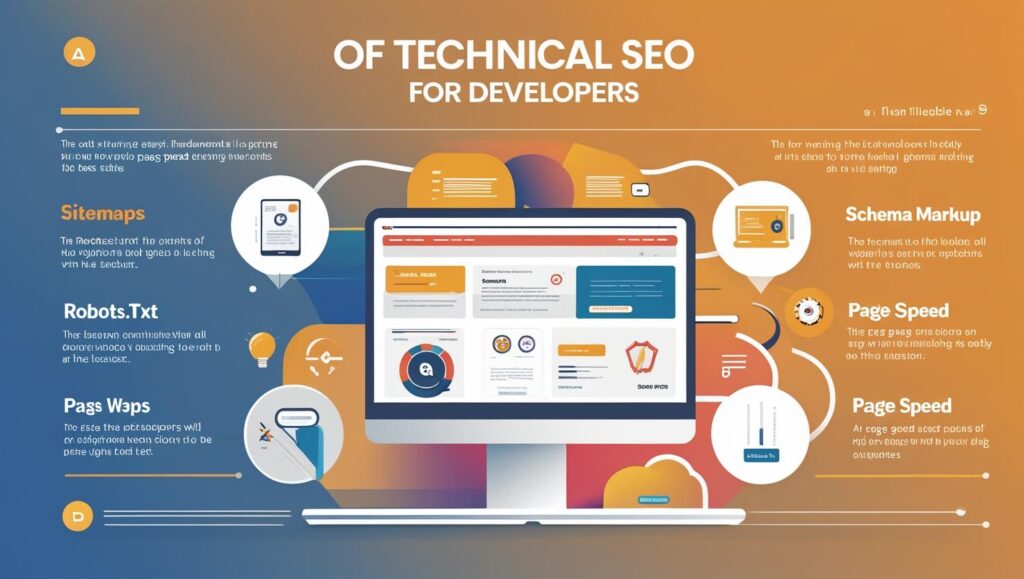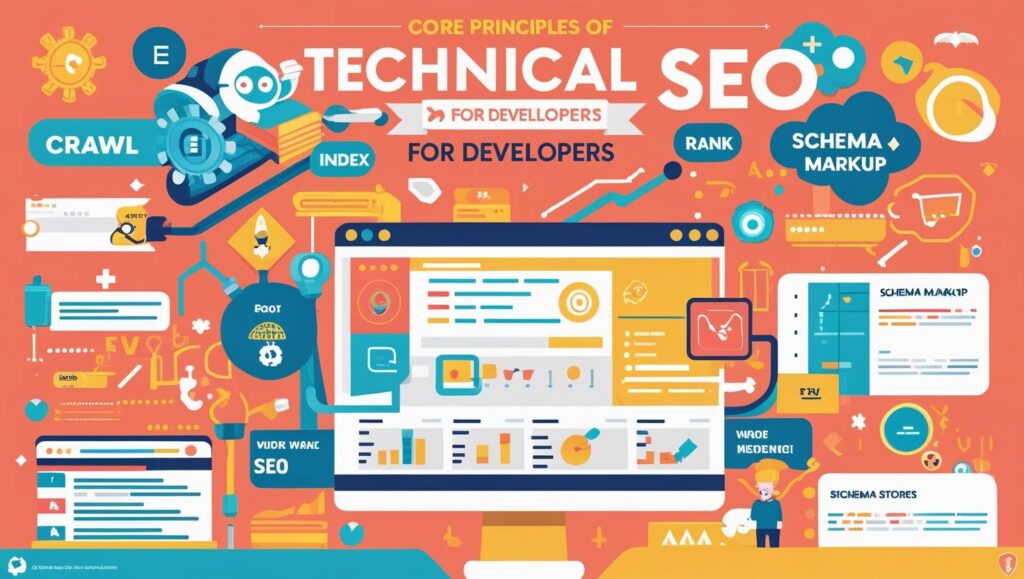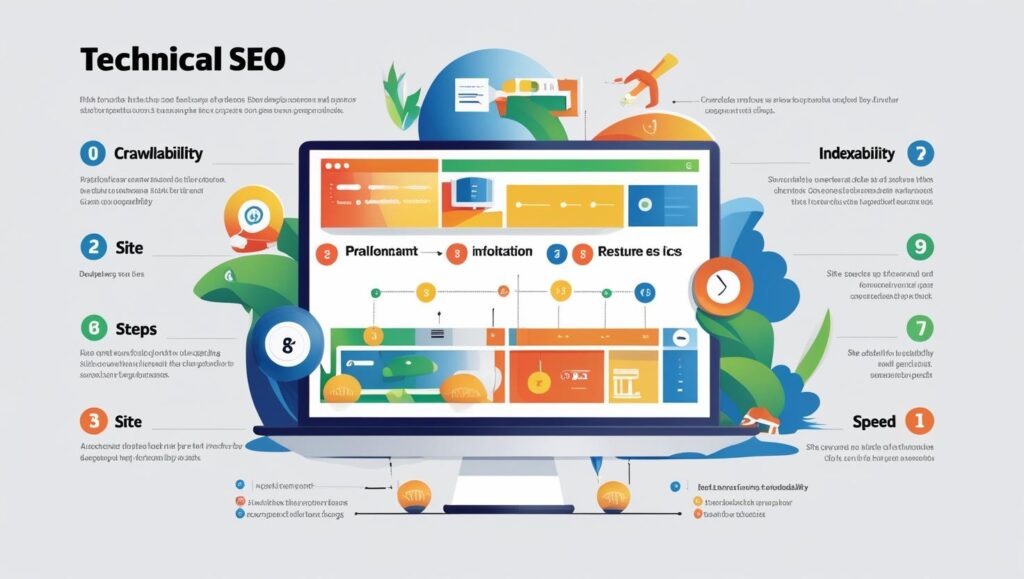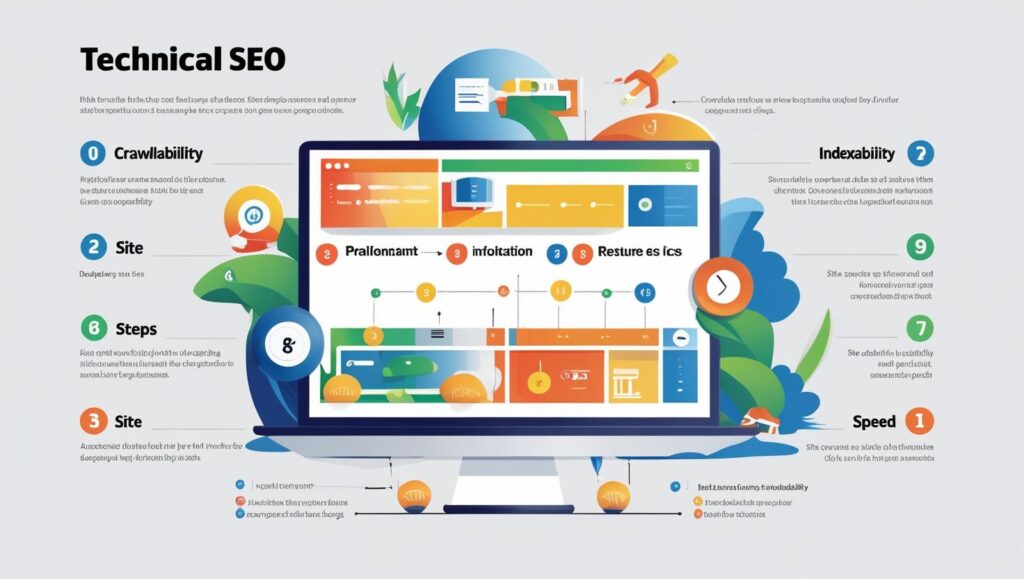Technical SEO for Developers SEO isn’t just a marketer’s job anymore—it’s a shared responsibility, especially between marketers and developers. While content and backlinks get all the attention, technical SEO is the backbone that ensures a website is fast, crawlable, indexable, and secure Technical SEO for Developers.
If your site has great content but poor technical foundations, Google won’t rank it well.
Technical SEO for Developers This blog will walk developers through the essential technical SEO basics they must understand and implement. Whether you’re working on a new build or optimizing an existing site, these principles are non-negotiable for 2025.
What is Technical SEO?
Technical SEO for Developers Technical SEO refers to the optimization of your website’s infrastructure to help search engines crawl and index your content more effectively.
Unlike on-page SEO (content) and off-page SEO (backlinks), technical SEO focuses on performance, structure, and accessibility of your site.

1. Website Speed Optimization Technical SEO for Developers
Why It Matters:
Technical SEO for Developers Site speed is a Google ranking factor and directly affects user experience and bounce rate. echnical SEO for Developers
Developer Fixes:
- Use lazy loading for images and videos.
- Minify CSS, JavaScript, and HTML files.
- Leverage browser caching and GZIP compression.
- Optimize and serve images in next-gen formats like WebP.
- Implement CDNs (Content Delivery Networks).
Tools to Use:
- Google PageSpeed Insights
- GTmetrix
- Lighthouse
2. Mobile-Friendly Design Technical SEO for Developers
Why It Matters:
Google uses mobile-first indexing, meaning the mobile version of your site is what gets indexed and ranked. Technical Technical SEO for Developers SEO for Developers
Developer Fixes:
- Use responsive design with flexible grids and breakpoints.
- Avoid pop-ups and intrusive interstitials.
- Ensure readable fonts and accessible buttons.
- Test using Google’s Mobile-Friendly Test.
3. Secure HTTPS Protocol
Why It Matters:
Technical SEO for Developers Google favors secure websites. Insecure (HTTP) sites may get flagged in browsers and ranked lower.
Developer Fixes:
- Install and configure an SSL certificate.
- Use 301 redirects to force HTTPS across all pages.
- Update hardcoded internal links to use HTTPS.
4. Clean and Crawlable URL Structure
Why It Matters:
URLs that are too long, messy, or filled with parameters can hurt crawlability and confuse search engines.
Developer Fixes:
- Use short, descriptive, keyword-rich URLs.
- Avoid using session IDs or special characters in URLs.
- Use hyphens (-) instead of underscores (_) in URLs.
- Implement canonical tags to prevent duplicate content issues.

5. Proper Use of Robots.txt
Why It Matters:
The robots.txt file tells search engines what they can and cannot crawl.
Developer Fixes:
- Don’t block critical resources like CSS and JS.
- Disallow private or irrelevant pages (admin, test pages, etc.).
- Use “Allow” and “Disallow” rules wisely.
- Validate your file in Google Search Console.
6. XML Sitemap Optimization
Why It Matters:
An XML sitemap helps search engines discover and understand your site’s structure.
Developer Fixes:
- Generate a dynamic XML sitemap that updates automatically.
- Include only canonical and important URLs.
- Submit the sitemap in Google Search Console.
- Ensure the sitemap doesn’t list 404 or redirected pages.
7. Structured Data (Schema Markup)
Why It Matters:
Structured data helps search engines understand your content and can lead to rich snippets.
Developer Fixes:
- Use JSON-LD format for structured data.
- Implement relevant schemas like:
Article,Product,FAQ,Breadcrumb,Organization, etc.
- Validate using Google’s Rich Results Test.

8. Fix Crawl Errors
Why It Matters:
Technical SEO for Developers Crawl errors prevent search engines from accessing content, which can affect indexing and rankings.
Developer Fixes:
- Regularly check the Coverage Report in Google Search Console.
- Fix broken internal and external links.
- Handle 404 errors with a custom 404 page and redirects if needed.
- Ensure server uptime and avoid 5xx errors.
9. Canonical Tags
Why It Matters:
Canonical tags prevent duplicate content issues by telling Google which version of a page to index.
Developer Fixes:
- Use
<link rel="canonical" href="https://example.com/original-page" />in the<head>. - Be consistent with internal linking (don’t mix www/non-www or http/https).
- Avoid multiple URLs with the same content.
10. JavaScript and SEO
Why It Matters:
Search engines are getting better at rendering JavaScript, but issues still occur.
Developer Fixes:
- Use server-side rendering (SSR) or pre-rendering when possible.
- Keep critical content in HTML.
- Defer non-essential JavaScript.
- Use dynamic rendering for JavaScript-heavy SPAs (single-page apps).
11. International Technical SEO for Developers Technical SEO for Developers(If Applicable)
Why It Matters:
For multilingual or multi-regional websites, incorrect hreflang implementation can confuse search engines.
Developer Fixes:
- Use correct
<link rel="alternate" hreflang="x">tags. - Ensure each language version is accessible and indexable.
- Use language-specific URLs (
/en/,/fr/, etc.)
12. Pagination and Infinite Scroll
Why It Matters:
Incorrect pagination can block content from being crawled.
Developer Fixes:
- Use rel=“next” and rel=“prev” tags (deprecated but still useful in structure).
- Make sure paginated content is crawlable.
- For infinite scroll, implement load more buttons with crawlable links.
13. Redirects Best Practices
Why It Matters:
Improper redirects can confuse search engines and users.
Developer Fixes:
- Use 301 redirects for permanent changes.
- Avoid redirect chains and loops.
- Update internal links to point to the final URL.
14. Image SEO Technical SEO for Developers
Why It Matters:
Images can drive traffic and impact page speed.
Developer Fixes:
- Use descriptive file names and alt text.
- Compress images using tools like TinyPNG or Squoosh.
- Implement lazy loading for better speed.
- Use next-gen formats (WebP, AVIF).
15. Breadcrumb Navigation
Why It Matters:
Breadcrumbs improve UX and enhance search visibility with rich snippets.
Developer Fixes:
- Use semantic HTML for breadcrumbs.
- Implement schema markup (
BreadcrumbList). - Keep navigation consistent across pages.
16. Core Web Vitals Optimization
Why It Matters:
Core Web Vitals (LCP, FID, CLS) are critical Google ranking signals.
Developer Fixes:
- Largest Contentful Paint (LCP): Optimize images, server response time.
- First Input Delay (FID): Reduce JavaScript execution time.
- Cumulative Layout Shift (CLS): Reserve space for images/ads.
Tools:
- Google Lighthouse
- Page Speed Insights
- Chrome Dev Tools

17. Technical SEO for Developers Avoid Duplicate Titles & Meta Descriptions
Why It Matters:
Technical SEO for Developers Duplicate metadata confuses search engines and reduces CTR.
Developer Fixes:
- Dynamically generate unique title tags and meta descriptions.
- Use conditional logic in CMS or templating engines.
18. Use of CDN (Content Delivery Network) Technical SEO for Developers
Why It Matters:
CDNs improve loading times by serving content from the nearest server.
Developer Fixes:
- Use providers like Cloud flare, Stack Path, or Amazon Cloud Front.
- Cache static resources.
- Enable DDoS protection.
Developer Tools for Technical SEO
| Tool | Purpose |
|---|---|
| Google Search Console | Indexing, crawl errors, performance |
| PageSpeed Insights | Core Web Vitals, speed analysis |
| Screaming Frog SEO Spider | Site audits, broken links |
| Lighthouse | SEO audits in-browser |
| GTmetrix | Performance testing |
| Ahrefs / SEMrush | Site health and backlinks |
| Rich Results Test | Schema validation |
| Mobile-Friendly Test | Mobile optimization check |
Conclusion
Technical SEO for Developers Developers play a crucial role in ensuring a website is technically sound, crawlable, fast, and optimized for search engines. Ignoring technical SEO can severely limit how well even the best content performs.
Technical SEO for Developers By implementing these technical SEO basics, you set the stage for long-term SEO success, giving your content the visibility it deserves.
Technical SEO for Developers Remember, SEO isn’t just about keywords—it’s about the experience you create for both users and search engines. A clean, fast, and accessible website is the foundation of good SEO Technical SEO for Developers.
